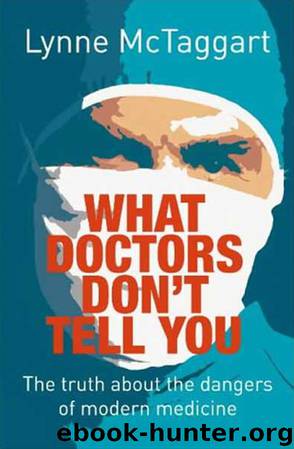What Doctors Don't Tell You by Lynne McTaggart

Author:Lynne McTaggart [McTaggart, Lynne]
Language: eng
Format: epub, mobi
ISBN: 9780007374168
Publisher: HarperCollins Publishers
Published: 2016-05-24T16:00:00+00:00
a placebo … Any mother who has sat up half the night with a crying child needs something to placate her. Any child whose excruciating earache has caused all this fuss needs a let out especially if it magically disappears as they reach the doctor’s surgery.18
Even if a doctor believes an antibiotic is truly necessary, he usually prescribes it before he knows for sure. In most instances, the GP might take a lab sample of the suspected infection, but he’ll also hand the patient a course of antibiotics to start immediately. The patient could be halfway through the course before he discovers he’s taken the wrong drug, or taken it for no reason.
This makes sense in life-threatening cases where a patient might be dead in the 36 or 72 hours required to get results back from the lab, but not with more benign problems, particularly when clinical diagnoses so often are wrong. In only half of all so-called cases of cystitis, for instance, are Escherichia coli bacteria, the cause of true cystitis, actually present, says Professor Ian Phillips, a microbiologist at London’s St Thomas’ Hospital.19
Hospitals also tend to over-use antibiotics as a just-in-case measure for surgical patients ‘in case’ they develop infections during surgery. ‘For instance, it’s known that antibiotics are helpful during surgery of the large bowel to prevent infection,’ says Phillips. ‘This gets extrapolated into completely clean surgery like hysterectomies or appendectomies where there is no clear indication,’ he says. Hospitals even routinely administer antibiotics to premature newborns, ‘just in case’ they fall prey to bacteria.
Up till now, doctors haven’t worried about over-prescribing because they figured the drugs do little harm to patients other than perhaps a little tummy upset. Only 5 per cent of the population was thought to be seriously allergic to penicillin. But a glance at the British National Formulary reveals many potentially crippling side-effects of antibiotics: prolonged use of neomycin to treat liver disease can cause the liver to malfunction: tetracycline can permanently stain a child’s teeth yellow; chloromycetin can interfere with the bone marrow’s production of red blood cells; and chloramphenicol can cause irreversible, potentially fatal bone-marrow depression.
Even more worrisome, repeated courses of antibiotics appear to seriously disturb our immune systems in ways that medicine doesn’t yet understand. Health writer Geoffrey Cannon, author of Superbug (Virgin Publishing), refers to the current use of antibiotics as the ‘Domestos theory of human health – if there are bacteria present in the gut then they must be blasted out.’ Allergy specialist Dr John Mansfield, who regularly treats immune system disorders such as candida albicans, believes that ‘undoubtedly the most common cause is the broad-spectrum antibiotic. Three or four courses can often push a patient over the precipice into chronic illness.’
Because antibiotics wipe out good bacteria and bad, once the good bacteria in the gut are eliminated candida or one or another opportunistic yeasts or moulds in the gut can overpopulate. The toxins they send out can inhibit T-lymphocytes, the main search-and-destroy cells in the immune system.
Download
What Doctors Don't Tell You by Lynne McTaggart.mobi
This site does not store any files on its server. We only index and link to content provided by other sites. Please contact the content providers to delete copyright contents if any and email us, we'll remove relevant links or contents immediately.
| Bone Cancer | Brain Cancer |
| Breast Cancer | Colorectal |
| Leukemia | Lung Cancer |
| Lymphatic | Prostate Disease |
| Skin Cancer |
Men In Love by Nancy Friday(4335)
Everything Happens for a Reason by Kate Bowler(4074)
The Immortal Life of Henrietta Lacks by Rebecca Skloot(3830)
Why We Sleep by Matthew Walker(3778)
The Sports Rules Book by Human Kinetics(3593)
Not a Diet Book by James Smith(2730)
The Emperor of All Maladies: A Biography of Cancer by Siddhartha Mukherjee(2433)
Sapiens and Homo Deus by Yuval Noah Harari(2418)
Day by Elie Wiesel(2244)
Endless Forms Most Beautiful by Sean B. Carroll(2085)
Angels in America by Tony Kushner(2051)
A Burst of Light by Audre Lorde(1982)
Hashimoto's Protocol by Izabella Wentz PharmD(1900)
Dirty Genes by Ben Lynch(1858)
Reservoir 13 by Jon McGregor(1856)
Stretching to Stay Young by Jessica Matthews(1715)
Fat for Fuel by Joseph Mercola(1698)
The Immune System Recovery Plan by Susan Blum(1695)
Boost Your Brain Power in 60 Seconds by Michelle Schoffro Cook(1678)
